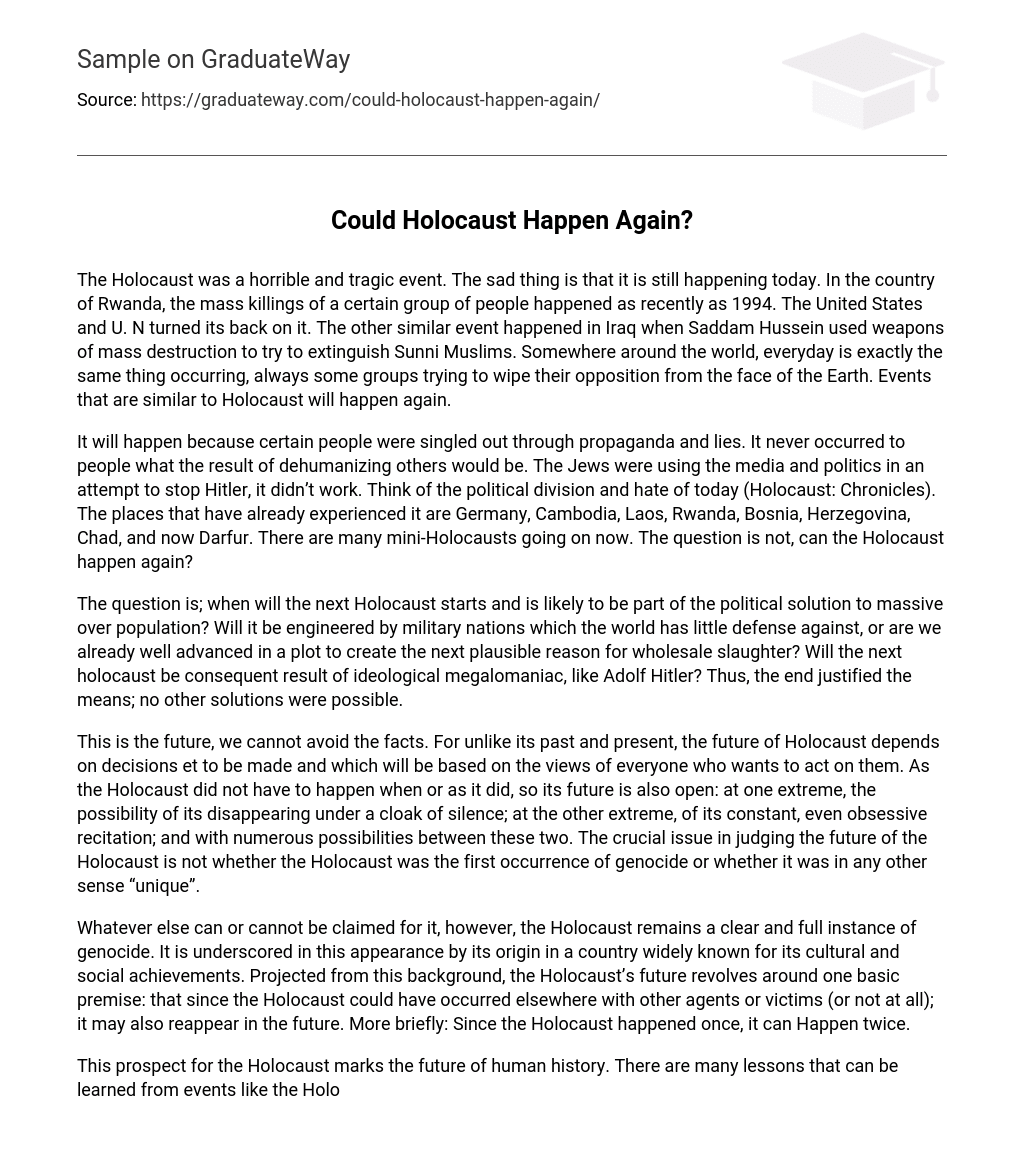The Holocaust, a horrific and sorrowful occurrence, persists in various forms today. In 1994, for instance, Rwanda witnessed mass killings aimed at a particular community. Surprisingly, the United States and U.N opted not to intervene. Similarly, Saddam Hussein employed weapons of mass destruction in Iraq with the intention of eradicating Sunni Muslims. Regrettably, such acts of violence persist globally on a daily basis as certain factions strive to eliminate their adversaries. It is unfortunately certain that events akin to the Holocaust will reoccur.
The Holocaust could occur again as a result of certain individuals being targeted through propaganda and deceit. The consequences of dehumanizing others were not considered at the time. In an effort to thwart Hitler, the Jews utilized media and politics, but their efforts were unsuccessful. Presently, there is an abundance of political division and animosity, akin to the Holocaust. Germany, Cambodia, Laos, Rwanda, Bosnia, Herzegovina, Chad, and now Darfur have already witnessed its horrors. Currently, there are multiple ongoing instances of similar atrocities. Therefore, the pertinent question is not whether the Holocaust can happen again.
The question is: when will the next Holocaust occur, and could it be perceived as a political remedy for overpopulation? Are there military forces capable of orchestrating it, rendering the world vulnerable? Alternatively, are we currently strategizing to establish a plausible rationale for large-scale slaughter? Will this forthcoming Holocaust arise from an ideological megalomaniac akin to Adolf Hitler’s rule? According to their perspective, the desired outcome justifies any methods employed, leaving no space for alternative resolutions.
This is the future, we cannot evade the facts. The future of the Holocaust relies on forthcoming decisions, influenced by those who desire to take action. The Holocaust could have unfolded differently, leaving its future uncertain. It might either diminish and fade into oblivion or persistently be recalled and deliberated upon. Numerous possibilities exist between these extremes. Evaluating the future of the Holocaust does not hinge on whether it was the initial genocide or possessed any other form of “uniqueness”.
Despite any other claims that may or may not be made about it, the Holocaust is unequivocally a distinct and comprehensive illustration of genocide. Its importance is underscored by its origins in a country internationally recognized for its cultural and social achievements. Given this historical context, the future of the Holocaust hinges on one fundamental conviction: that since it could have unfolded elsewhere with alternate perpetrators or victims (or not at all), it remains possible for history to repeat itself. In essence, because the Holocaust transpired once, the potential for its recurrence exists.
This prospect for the Holocaust symbolizes the future of human history. There are multiple lessons to be gleaned from events like the Holocaust: we must eliminate racism from our society, and instead of fearing differences, we should aim to respect one another’s ethnic, cultural, religious, and sexual diversities (Holocaust: chronicles). The most important lesson from the Holocaust is that it is vital to confront bigotry in its early stages before hatred gains strength. As B. Garner said, “Indifference is the true evil. All that is needed for evil to flourish is for good people to do nothing.”
Works Cited
Can it Happen Again? Chronicles of the Holocaust Jack Spencer, Roselle K. Chartock, and Publisher: Black Dog & Leventhal Publishers, Copyright 1995 – 2008 Muze Inc.
The Holocaust: Can it happen again? Carl B. Garner: Bible Articles. http://www.ds-churchofchrist.org/carls_articles/holocaust.html
Why the Holocaust can happen again? Robert W. Tracinski: Capitalism Magazine. http://www.capmag.com/article.asp?ID=2728





